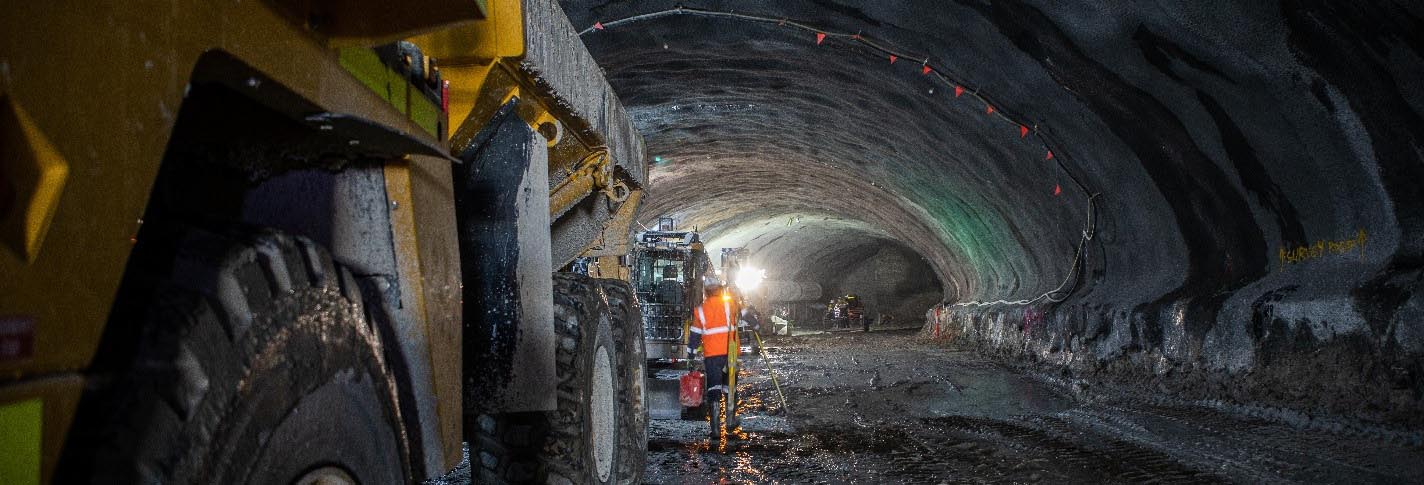UndergroundRelease of New ASTM Round Panel Test
Stefan Bernard
Read MoreFollowing a 3-year development period, a new test for post-crack performance assessment of ï¬ber-reinforced shotcrete (FRS) and ï¬ber-reinforced concrete (FRC) based on round panels was passed by ASTM Committee C 09 in June 2002. The standard test method, known as C 1550-02, œStandard Test Method
UndergroundInternationalShotcreting in Australian Underground Mines: A Decade of Rapid Improvement
Matthew Clements
Read MoreOver the last decade, dramatic improvements in spraying technology have allowed shot-crete to become the first-choice ground support in many underground mines in Australia. Before 1994, only a very small amount of dry spray shotcrete was used. Since then, the increased use of wet-mix ï¬ber-reinforced
UndergroundDetermination of Early-Age Ductility of Steel Fiber-Reinforced Shotcrete Lining System at INCO’s Stobie Mine
Jean-Francois Dufour, J. Denis P. O'Donnell, Sr., and Michael Ballou
Read MoreThe state of technology in shotcrete materials has evolved steadily throughout the world and particularly in North America during the last 20 years. The use of supplementary cementing materials such as silica fume, fly ash and slag, the new generations of chemical admixtures, and the
UndergroundCombining Shotcrete Mixes for Maximum Performance
J. Denis P. O’Donnell, Sr.
Read MoreRebound is an essential element in the application of shotcrete. Rebound is deï¬ned as follows: œMainly large aggregate with some sand and cement that bounces or ricochets off the receiving surface and falls on to lower surfaces.1 There is a vital function that is achieved
UndergroundIs Computerized Shotcreting a Possibility? It’s a Reality!
Michael Rispin
Read MoreA nozzleman who has made a transition from hand-nozzling to using a robotic arm knows the value that mechanical technology has brought to our industry. Far beyond just saving human backs and arms during a shift of spraying concrete, robotic arms (booms, lances, etc.) have
UndergroundStructuralShotcrete for Ground Support: Current Practices in Western Canada
Cesar Chan, Roland Here, and Dudley R. Morgan
Read MoreHistorically, in Western Canada, the stabilization of rock slopes and construction of excavations have been achieved using methods such as soldier piles and lagging or construction of cast-in-place concrete retaining walls. In the case of reinforced cast-in-place concrete, there is a requirement for erection of
RepairUndergroundThe Art of Tunnel Rehabilitation with Shotcrete
Harvey Parker, Paul Godlewski, and Roberto Guardia
Read MoreThe art of rehabilitation of tunnels has flourished and developed significantly over the last couple of decades. Several hundred railroad, highway, and conveyance tunnels have been successfully rehabilitated, converted, and/or enlarged. Much of this development can be attributed to the successful use of steel fiber-reinforced
UndergroundShotcrete in Fires: Effects of Fibers on Explosive Spalling
Peter C. Tatnall
Read MoreIn those of us in the concrete industry, the events over the last year have caused many of us to focus on the effects of blasts and fire on concrete structures. Information on the effects of fire on normal strength concrete (NSC) less than 7000
UndergroundStructuralSoil and Rock Slope Stabilization Using Fiber-Reinforced Shotcrete in North America
Mike Ballou and Matt Niermann
Read MoreUndergroundWelcome to Underground Atlanta
Charles M. Brown
Read MoreWe are standing in the very bowels of the City of Atlanta. This isn™t the trendy œUnderground Atlanta of rock-till-you-drop nightclub fame. The millions of busy Atlanta citizens above us today don™t have any idea that we are down here. All they care about is

